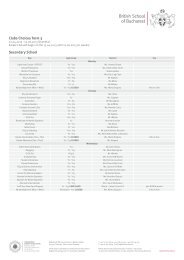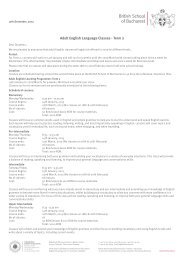November 2008 - British School Of Bucharest
November 2008 - British School Of Bucharest
November 2008 - British School Of Bucharest
You also want an ePaper? Increase the reach of your titles
YUMPU automatically turns print PDFs into web optimized ePapers that Google loves.
The Music Department adds a little Rhythm<br />
to Student Life at BSB<br />
Visit the BSB website at www.britishschool.ro<br />
Mr Des Mulvany leading<br />
a senior school assembly<br />
The History of the Drum kit<br />
All pupils are taught rhythm. Rhythm is a very<br />
important part of any piece of music. The pupils<br />
are taught about creating rhythm by playing<br />
drums and percussion instruments. They will<br />
find out what a drum is, about the history of<br />
drumming, and the different types of drums that<br />
they can play. Different types of drums are found<br />
around the world.<br />
A drummer keeps the other musicians playing<br />
together and helps make sure that nobody<br />
speeds up or slows down.<br />
Choosing your style<br />
One of the great things about the drums is that<br />
they are relatively easy to learn. With a little<br />
practice you will be able to play a basic beat<br />
within a few hours. Within a few months, you will<br />
be able to play along to your favorite songs<br />
Drums can be played in a wide variety of musical<br />
styles, from classical and jazz, to rock and pop<br />
music. They can be played alongside other<br />
percussion instruments. But first, there are some<br />
basic things that every drummer should know.<br />
The history of drumming<br />
If the human voice is the oldest instrument in<br />
the world, drums are a close second. This is not<br />
surprising when you think that drums are a quite<br />
simple instrument. All you need to make a drum<br />
is a stick and a surface to hit. The oldest drums<br />
found date back over 6,000 years. Drums were<br />
once used to communicate. A person’s voice<br />
does not carry very far, but drums can be heard<br />
for many miles. In certain areas of Africa drums<br />
were worshipped and even given names.<br />
When the Ancient Greeks and Romans arrived in<br />
Africa, they started using African drums to keep<br />
soldiers marching in pace and call out orders.<br />
Many European armies continue this tradition of<br />
using drums when they marched.<br />
The Modern Drum Kit<br />
By the 1920s, musicians began to play more<br />
than one drum at the same time. Once the<br />
drums were arranged properly, bands didn’t<br />
need a group of drummers any more. Bit by bit,<br />
the modern drum kit took shape.<br />
The Electronic drum kit was developed in the<br />
1980 by a company called Simmons but it will<br />
never replace the normal drum kit.<br />
Drum facts: The largest drum kit.<br />
The worlds largest drum kit is played by<br />
Michael Mc Neill from Missouri. His drum kit<br />
consists of 105 pieces: 7 drums, 19 toms, 3<br />
snares, electronic drums.10 percussion drums,<br />
25 cymbals, 16 bells, 20 other percussion<br />
instruments and 1 kitchen sink.<br />
Famous Drummer<br />
Buddy Rich is regarded as the greatest jazz<br />
drummer of all time. His career started at the<br />
age of 3 years and spanned decades. He won<br />
many awards for his drumming despite the fact<br />
he could not read a note of music and he never<br />
received a single drumming lesson. All the<br />
students have drumming lessons in the <strong>British</strong><br />
school of <strong>Bucharest</strong>. The great thing about<br />
drumming is that you don’t even need a drum kit<br />
to get started! Most drummers will tell you that<br />
they always tap on different things. This is, after<br />
all how drumming started many thousands of<br />
years ago. Before long, recognising rhythms will<br />
become a habit. This first exercise will get you<br />
thinking about those rhythms.<br />
Mr Des Mulvany MA, BA hons, PGCE<br />
Head of Music<br />
Mr Des Mulvany<br />
Mr Desmond Mulvany comes from Ireland but<br />
has lived for many years in America. He has been<br />
teaching for 10 years and moved to Romania in<br />
September of 2007. The schools where he has<br />
taught before were all in England and he enjoyed<br />
his teaching experience then a lot because<br />
he says that his was one of the most popular<br />
subjects. He says that he enjoys teaching in BSB<br />
because it’s a nice school in a nice atmosphere<br />
with many lovely students. He thinks there are<br />
many students currently enrolled at BSB with a<br />
lot of musical talent playing a variety of musical<br />
instruments, and this makes his teaching<br />
experience particularly colourful. He is now also<br />
preparing three students from Year 10, including<br />
myself, for the IGCSE exams.<br />
If you want to learn more about Mr Mulvany<br />
and his colourful musical past, then why not<br />
stop by the music room for a friendly chat. He is<br />
always happy to share a few stories with anyone<br />
passing by- and believe me he does have some<br />
interesting stories!<br />
Edoardo, Year 10<br />
The <strong>British</strong> <strong>School</strong> of <strong>Bucharest</strong> Magazine<br />
11
















